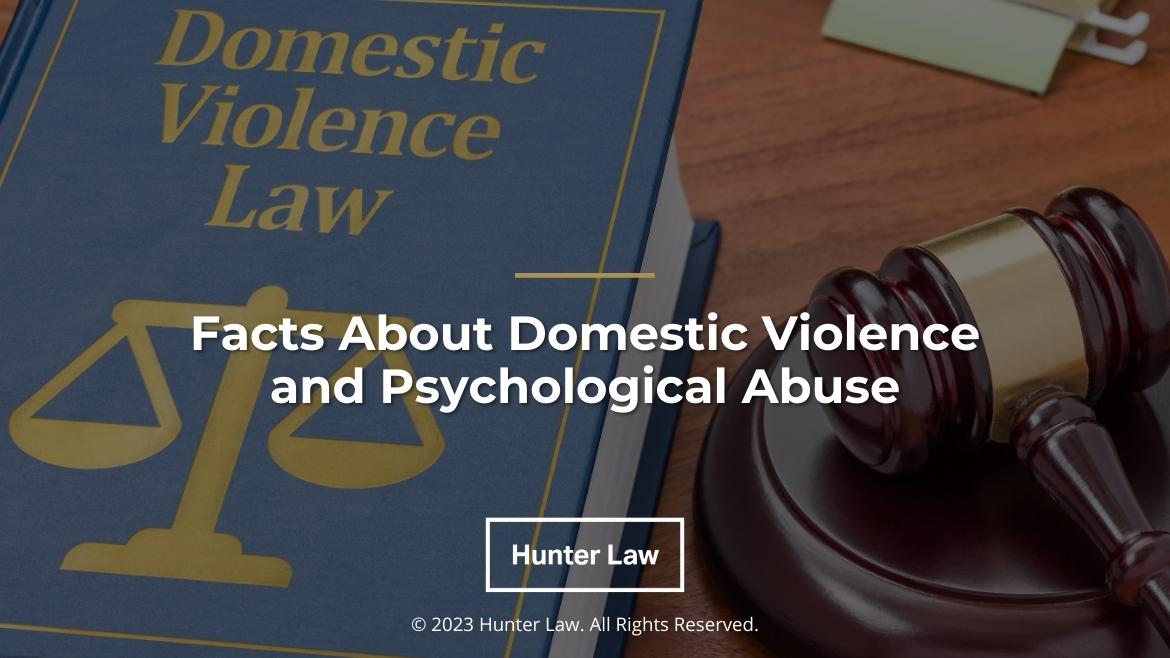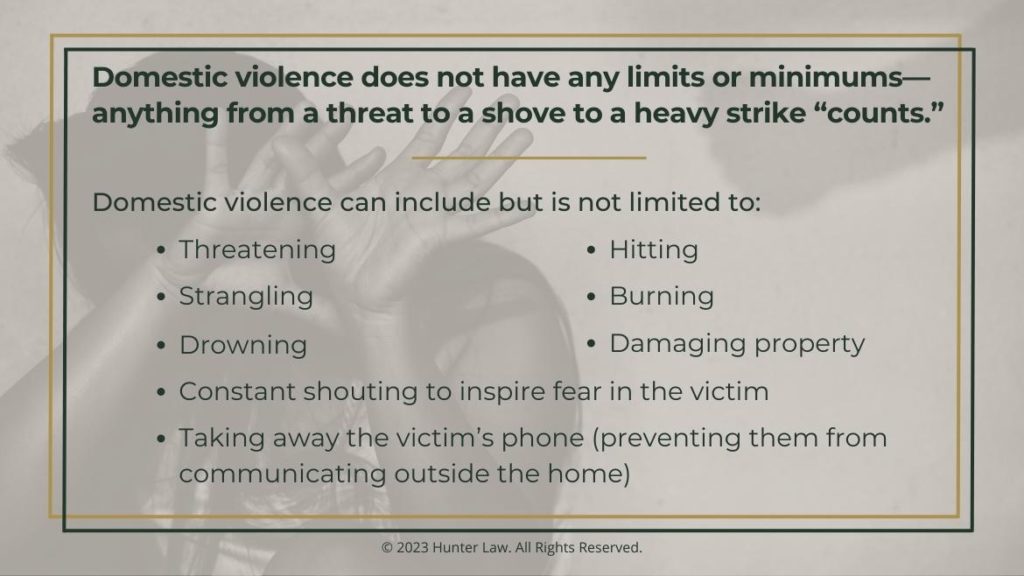Domestic violence is unfortunately far too common and may impact people you know and love. Domestic violence and psychological abuse typically occur between cohabitants, such as spouses or parents and children. No matter the specifics or reasons, these abuses are always concerning.
Read on for more information about domestic violence and psychological abuse and to learn what to do if you or a loved one are trapped in these situations.
What Is Domestic Violence?
Domestic violence is any violence that occurs between two or more individuals who live together or share the same domicile (“dating violence” is a different but very similar issue between parties who are not living together). These individuals can include cohabitating spouses, significant others/romantic partners, parents and children, siblings, and more.
Anything ranging from a threat to a shove to a heavy strike “counts” as domestic violence, as it is felt both physically and emotionally. It does not have any limits or minimums.
Domestic violence can include but is not limited to:
- Threatening
- Hitting
- Constant shouting to inspire fear in the victim
- Sexual violence, including sexual assault
- Strangling
- Burning
- Drowning
- Damaging property (clothes, the house, the car, etc.)
- Taking away the victim’s phone (preventing them from communicating outside the home)
Signs of Domestic Violence
The signs are oftentimes physically visible in the form of:
- Bruises
- Lacerations or cuts
- Walking strangely, such as with a limp or while holding one’s side
- Difficulty concentrating
- Fearful behavior, especially around the perpetrator
However, some signs can also be more subtle and difficult to spot in others. For example, a victim of this violence may outwardly appear happy and highly devoted to a new romantic partner but later hint that they are unhappy or afraid.
They may also seem cold to, distant from, or non-communicative with friends or family members, possibly because of threats made against them by the perpetrator.
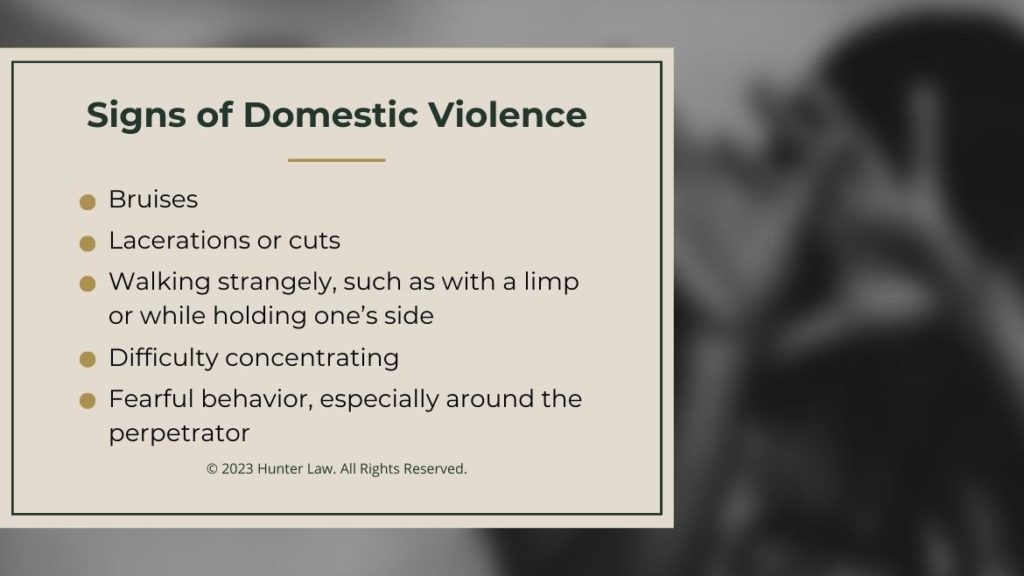
What Is Psychological Abuse?
Psychological abuse is oftentimes accompanied by physical domestic violence and trauma. Psychological abuse includes trauma caused to a victim by any combination of threats of violent acts, verbal abuse, actual physical acts, and coercive tactics.
Many perpetrators use psychological abuse to terrorize and control their victims. They may use humiliation to prevent victims from feeling as though they can speak about their domestic abuse or may “gaslight” their victims into believing that they don’t have a firm grasp on reality.
Although psychological abuse is not as outwardly visible as the signs of physical domestic violence, it can be just as damaging. Psychological abuse can include but is not limited to:
- Stalking a victim
- Withholding important information from a victim
- Controlling what a victim can do through words or threats
- Humiliating a victim
- Convincing a victim that he or she is crazy
- Demeaning the victim or undermining the victim’s sense of self-worth
- Isolating the victim from friends and family members
Approximately 48.4% of women and 48.8% of men have experienced psychologically aggressive behavior by at least one intimate partner. Furthermore, 4 in 10 women and men have experienced at least one type of coercive control by an intimate partner. 95% of men who physically abuse intimate partners also psychologically abuse them.
Signs of Psychological Abuse
The signs of psychological abuse are similar, but may also be different. Some common signs of psychological abuse include:
- Cutting off relationships with others, especially friends or family members
- Losing self-confidence
- Adopting self-harm habits or behaviors, like cutting
- Appearing distant, detached, or unable to express oneself normally
- Frequent crying or grief-driven behavior
- Difficulty making decisions or taking action
If you or a loved one are victims of domestic violence and/or psychological abuse, it may be wise to contact emergency services, get to safety, and contact experienced domestic violence lawyers in Tampa.
Read more in our blog: Spousal Abandonment Laws in Florida
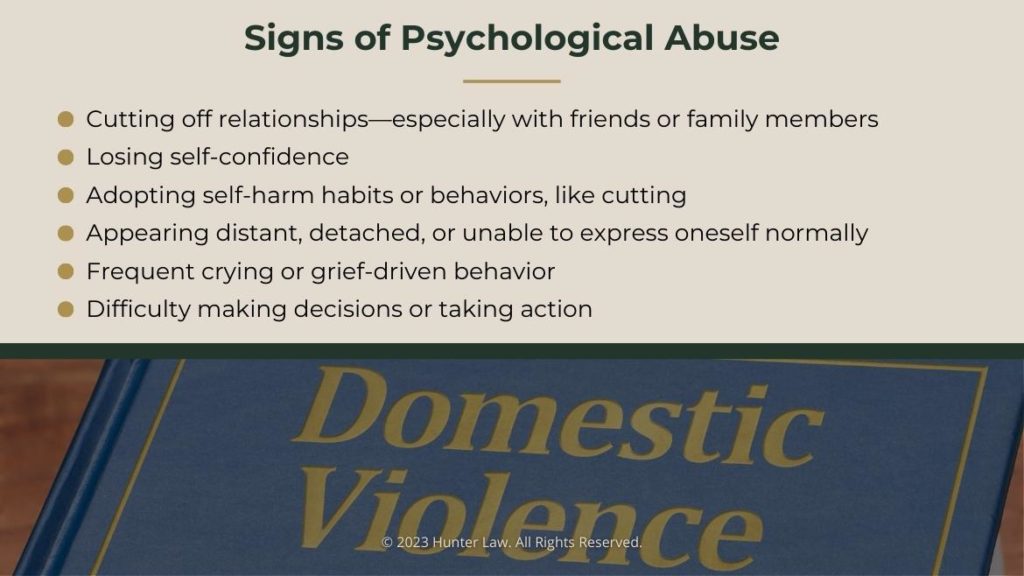
Major Facts About Domestic Violence and Abuse
According to the National Coalition Against Domestic Violence, approximately 20 people per minute are physically abused by intimate partners in the US. Furthermore, 1 in 4 women and 1 in 9 men experience severe intimate partner physical violence. This can include intimate partner stalking or intimate partner contact sexual violence.
Other resources indicate that it is more common among women. The CDC’s National Intimate Partner and Sexual Violence Survey indicates that 41% of women experience contact sexual violence or physical violence by an intimate partner during their lifetime. 26% of men experience the same.
Domestic violence and psychological abuse also affect children and teenagers. The Connecticut Coalition Against Domestic Violence indicates that 17.9% of children of all ages are exposed to physical intimate partner violence at least once. Furthermore, 21% of female high school students and 10% of male students experience physical and/or sexual dating violence.
Domestic violence and psychological abuse can happen to anyone. If it happens to you, don’t give up. There are resources and organizations that can help you.
How to Protect Yourself Legally and Emotionally When Divorcing a Narcissist
Where to Get Domestic Violence Help
If you or a loved one are involved in a threatening situation, know that there are resources you can use to get to safety.
Firstly, if you are in an emergency situation, call 911 when it is safe to do so. If needed, you may call 911 and emergency services and subtly hint at these kinds of threats instead of discussing them openly – operators are trained to recognize these hints and provide assistance.
If you are not in any immediate danger, you can contact the National Domestic Violence Hotline at 1-800-799-SAFE (7233). Alternatively, visit Domesticshelters.org. Both of these resources can help you find a safe haven away from your abuser while you determine your next options.
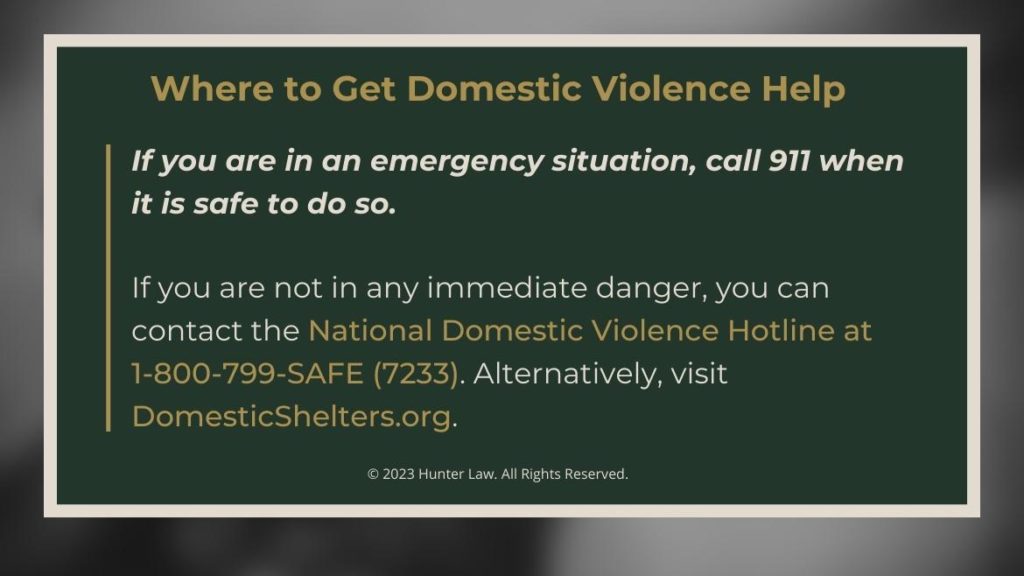
Contact Tampa Domestic Violence Lawyers
Once you’ve reached safety, consider speaking to knowledgeable legal representatives. Tampa domestic violence lawyers like Hunter Law can provide sound legal counsel and help you understand the right steps to take to protect yourself, such as pursuing a restraining order. Our Tampa divorce lawyers can also help you take further steps to end your marriage or partnership. For more information and a free consultation, contact us today.


